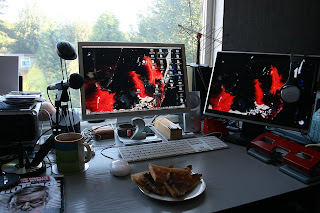How’s this for a thought? The Salem Witch Trials were not about religion or fear or superstition, they were about soil.
Seriously. If you didn’t already think this, and it hadn’t ever occurred to me in my most geo-cynical mood*, then you are forever going to think it now because you just know it’s true. Burn a widow as a witch and there’s nobody left to stop you taking her land.
I love this kind of thing: the one starkly simple idea that’s new yet feels so right that you must always have known it. And I didn’t get this information – notice how it’s already changed from a thought to information – from a documentary or a script or a novel. I also, despite the title of this piece, didn’t get it from a song lyric. Not yet.
For Dar Williams has a new album coming, Promised Land, due September 9 in the US and hopefully the same day or sooner here. And there’s an interview with Dar about it on YouTube. In it, she talks about having this same Damascus moment when a friend suggested this Witch Trial point to her. Now I believe she’s done a song about it.
Funny: saying that feels trivial. Cor, there’s this powerful notion, let’s sing a song, let’s put the show on right here. But I tell you, as I have told many before you, that while I wouldn’t kill to write like Dar Williams, I would consider maiming.
If you don’t know her work, I envy the fun of what’s ahead of you, but if you do then you’ll know that she has this huge range of material but generally it’s always immensely memorable and catchy musically, and the lyrics are pounding with more thought than you might see in a novel.
Now, I’m a scriptwriter and in a script you have to carry an awful lot of information in dialogue. You’re only doing it right when everyone still sounds natural. (“Whisky, eh? That’s a strange drink for an attractive auburn-haired girl of twenty-nine.”**) In a song it doesn’t really seem to matter: if it did, if people listened to lyrics, how could anyone think Born in the USA was pro-American?
Yet here’s Dar Williams, packing every song out with really pin-sharp puncturing ideas but doing it in such a way that you just unconsciously end up humming entire paragraphs as easily as you do the main chorus line of any chart song. She’ll make you smile, she will make you laugh, and there are songs of hers that make me weep, I think they’re so perfectly done.
She finds these truths, she conveys them with such intelligence and concise precision: Dar Williams doesn’t write scripts, so far as I know, but she’d still be on my list if you were foolish enough to ask me to list my favourite scriptwriters.
William
*Honest, I get geo-cynical. Can you tell me how Gerry Mander managed to get *both* of his names immortalised? These are the things that keep me awake.
**That’s from Timothy West’s deliberately bad radio play. This Gun That I Have In My Right Hand Is Loaded. I told a friend I’d look out my copy for him, but that’d mean loaning a book so I’m compromising and releasing one sentence per blog entry.




